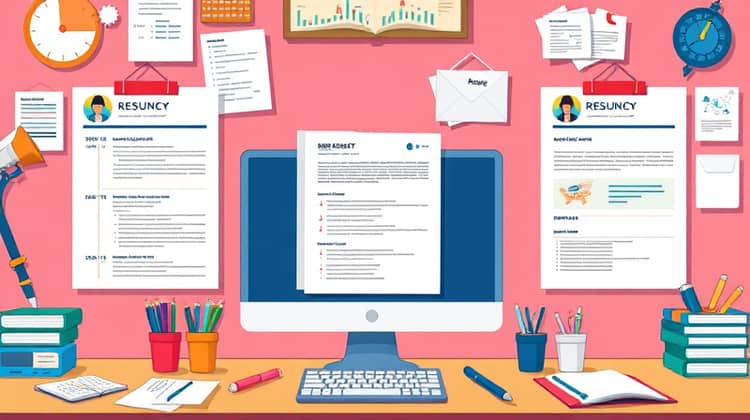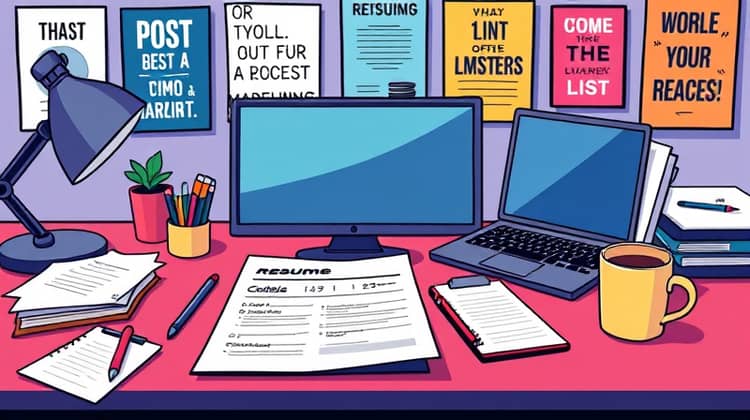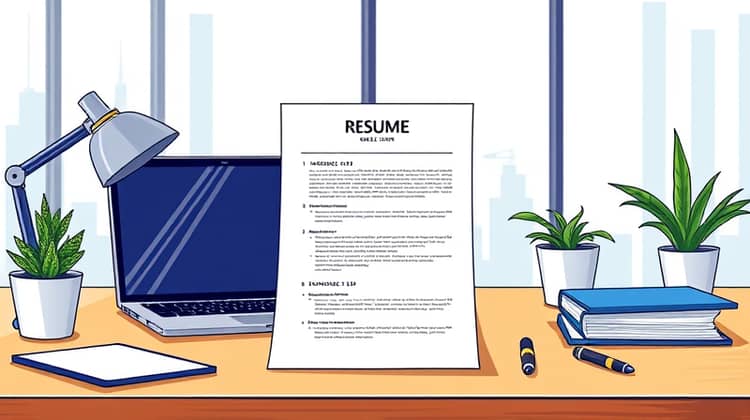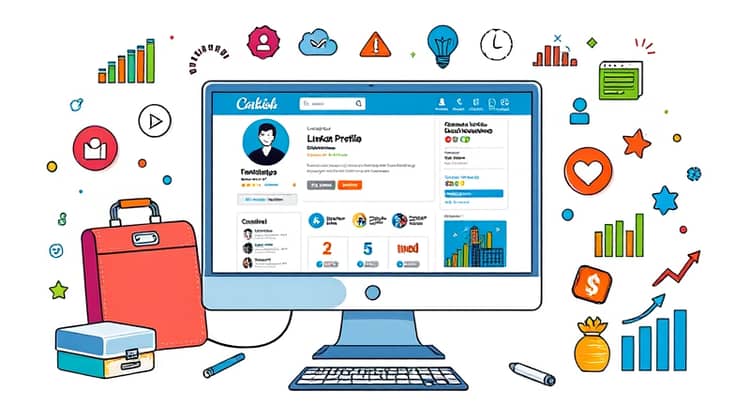Writing an effective resume is crucial in today's competitive job market. It serves as your personal marketing tool, showcasing your skills and experiences to potential employers. A well-crafted resume not only highlights your qualifications but also reflects your professionalism and attention to detail.
In this article, we will explore key strategies for creating a resume that stands out. Whether you're entering the job market for the first time or looking to update your existing resume, understanding the essentials of resume writing can significantly improve your chances of landing an interview.
We will cover various aspects of resume writing, from choosing the right format to tailoring your content for specific job applications. By following these guidelines, you can create a compelling resume that presents your credentials in the most favorable light.
1. Understand the Purpose of a Resume

The primary purpose of a resume is to provide a concise summary of your qualifications, skills, and work history to potential employers. It acts as a marketing tool that helps you secure job interviews by making a strong first impression. Understanding this purpose is crucial when crafting your resume, as it influences the content and format you choose to use.
Additionally, a resume serves to highlight your strengths and unique contributions to potential employers. This means you should carefully consider what experiences and skills are most relevant to the job you're applying for. Your resume should not only list past jobs but also demonstrate how your background makes you a suitable candidate for the position.
Effective resumes are tailored to the specific needs of each job application, emphasizing the qualifications that are most pertinent to the role. This tailored approach increases your chances of catching the attention of hiring managers who are often inundated with numerous applicants.
- To summarize your qualifications clearly and effectively.
- To highlight skills relevant to the job you're applying for.
- To differentiate yourself from other candidates.
2. Choose the Right Format

Choosing the right format is critical to presenting your resume effectively. There are several formats to consider, each with its advantages and disadvantages. The most common resumes include chronological, functional, and combination formats. By understanding the differences between these formats, you can select one that best showcases your qualifications and suits your work history.
The chronological format is best for those with a solid and continuous work history, presenting work experience in reverse chronological order. The functional format, on the other hand, emphasizes skills over experience, which can be beneficial for those with gaps in their employment or changing careers.
- Chronological: Emphasizes work history in reverse order.
- Functional: Focuses on skills rather than job history.
- Combination: Merges both approaches to highlight skills and experience.
Ultimately, your choice of format should enhance the reader's ability to quickly find the information they need about your qualifications. Keeping your resume neat and organized is essential as it reflects your professionalism.
3. Start with Contact Information

The first section of your resume should be your contact information. This section is vital as it allows potential employers to easily reach you. At a minimum, you should include your full name, phone number, email address, and LinkedIn profile or personal website if applicable.
Make sure that your email address looks professional and up-to-date. Avoid using nicknames or informal handles.
- Full name
- Phone number
- Professional email address
- LinkedIn profile link
Always make sure to double-check your contact details for accuracy. Any mistakes here could lead to missed opportunities.
4. Craft a Compelling Summary or Objective

A strong summary or objective statement can significantly enhance your resume. This brief introduction summarizing your career goals and qualifications should be tailored to the specific job you’re applying for. A compelling statement can help grab the hiring manager's attention right from the start.
In your summary, focus on your most relevant skills and experiences. Highlight what you bring to the table and how you can contribute to the prospective employer's success.
5. Highlight Your Work Experience

Your work experience section provides the bulk of the information that employers will use to assess your candidacy. Clearly outline your previous positions, emphasizing responsibilities and successes in each role. Each entry should include the job title, company name, location, and dates of employment, followed by bullet points describing your key achievements.
Make sure to tailor this section to include job experiences that are most relevant to the position.
- Job title and company name
- Dates of employment
- Key responsibilities and achievements
6. Showcase Your Skills

Your resume should also include a section dedicated to showcasing your skills. This can be done in bullet points or a brief list, featuring both hard and soft skills. Be specific and include skills that are directly relevant to the job you're applying for, as this helps demonstrate your suitability.
Highlighting your skills effectively can make a substantial difference in setting you apart from other candidates.
- Technical skills relevant to the job.
- Communication skills.
- Problem-solving abilities.
- Project management skills.
This skills section serves as a quick reference for hiring managers to assess your capabilities and fit for the position.
7. Include Education

Your education section should provide key information about your academic background. Include the degree obtained, the institution attended, and the graduation date. If you have specialized training or certifications relevant to the job, include those as well.
In instances where you are a recent graduate, it may be beneficial to place your education section near the top of your resume.
8. Add Relevant Certifications and Awards

Don't overlook your certifications and any awards you may have received during your career. Including these achievements on your resume can help you stand out from other candidates. You may list noteworthy achievements alongside relevant courses, certifications, and accolades that relate to your field.
This section adds depth to your qualifications, indicating your commitment to continuous learning and professional development.
9. Tailor Your Resume for Each Job

One of the most effective strategies in resume writing is tailoring your resume for each job application. Take the time to read the job description carefully and align your experiences and skills with the job requirements. This not only increases your chances of getting noticed but also demonstrates your genuine interest in the position.
By customizing your resume, you highlight the most relevant experiences, making it easier for hiring managers to see how your background fits their needs.
- Review the job description against your resume.
- Highlight relevant experiences and skills.
- Use keywords from the job posting.
This personalized approach shows employers that you are proactive and capable of adapting.
10. Use Action Verbs and Quantifiable Achievements

Using action verbs can energize your resume and demonstrate your active involvement in previous roles. Words like 'led,' 'developed,' or 'achieved' are powerful ways to begin your bullet points that describe previous work experiences. Additionally, incorporating quantifiable achievements can enhance your credibility and show the impact you made in those positions.
For example, instead of saying 'responsible for managing a team,' you could say 'led a team of 5 to achieve a 20% increase in sales over six months.' These types of achievements make your contributions tangible and can captivate a hiring manager's attention.
- Use strong action verbs to start bullet points.
- Include numbers and statistics to showcase your impact.
- Quantify your achievements whenever possible.
11. Keep It Concise

Conciseness is key when it comes to resumes. Aim to keep your document to one or two pages maximum, depending on your experience. Hiring managers often have limited time to review resumes, so delivering your message clearly and succinctly is imperative.
Avoid excessive jargon and unnecessary details; instead, focus on the most pertinent information that supports your candidacy.
12. Proofread and Edit

Before submitting your resume, proofread it thoroughly. Spelling and grammatical errors can make a poor impression and suggest a lack of attention to detail. It's advisable to read through your resume multiple times, and consider having someone else review it for any inconsistencies or errors.
Taking this step ensures that your resume is polished and professional, presenting you in the best light possible.
- Check for spelling and grammatical errors.
- Ensure consistency in formatting.
- Verify contact information is accurate.
A flawless resume showcases your commitment to professionalism and can significantly impact your job search success.
13. Format Consistently

Consistency in formatting is essential for an effective resume. Use a clean, professional layout that utilizes uniform fonts, sizes, and spacing throughout the document. This approach helps your resume appear organized and easy to read, allowing hiring managers to quickly find critical information.
In addition, ensure that your headings and bullet points are consistent in style and alignment.
14. Consider Including a LinkedIn Profile or Personal Website

In today's digital world, including links to your LinkedIn profile or a personal website can add depth to your resume. These platforms provide additional information about your professional background and accomplishments, offering employers a more comprehensive view of your qualifications. Be sure to keep these profiles up to date and presentation-ready.
A well-maintained LinkedIn profile can serve as a digital manifestation of your resume, showcasing recommendations, endorsements, and other relevant content.
- LinkedIn profile link.
- Personal website or portfolio.
- Link to professional articles or publications.
Including these links can give you an edge over other candidates by allowing employers to delve deeper into your professional persona.
15. Get Feedback

Lastly, seek feedback on your resume from industry professionals, mentors, or trusted friends. They can provide valuable insights and suggestions for improvement that you might have overlooked. Getting a fresh perspective can be immensely beneficial in refining your resume further.
Engage with others who have successfully navigated the job market and learn from their experiences and observations.
- Share your resume with peers for their opinions.
- Consult with a career advisor or coach.
- Join forums or groups for resume reviews.
Incorporating feedback not only enhances your resume but also instills confidence in you as you prepare for your job search. Ultimately, a well-crafted and reviewed resume can be the key to unlocking career opportunities.














